The Young Reporter

Budget 18/19: the challenges and the road forward in Hong Kong
- 2018-02-28
- Politics
- The Young Reporter
- By: Katherine Li、Wallis WangEdited by: Candice Wong、Wing Li
- 2018-02-28
Reported by Katherine Li and Wallis Wang Edited by Candice Wong Infographics edited by Wing Li The Hong Kong government's budget surplus has reached $138 billion and the fiscal reserves are expected to reach $1.09 trillion, Financial Secretary, Paul Chan Mo-po revealed today in his budget speech. Hong Kong's economy grew by 3.8% over the past fiscal year. The financial secretary predicts that the gross domestic product will increase by between 3% and 4% in the coming year. Mr. Chan said he is "cautiously optimistic" about economic prospects in the coming year, based on the global monetary environment and geopolitical situations. Trends in innovation and technology, the shift in global economic gravity from West to East, protests against free trade and the call for de-globalisation and protectionism pose challenges, Mr. Chan pointed out. "To stay ahead of the game, we must enhance our I&T (Innovation and Technology) environment (and) attract companies from new economic sectors and research institutions to set up their presence in Hong Kong," Mr. Chan said. To overcome these challenges, Mr. Chan proposed to set aside $50 billion for I&T development. An additional $10 billion will be injected into a Technology and Innovation Fund, $500 million of which will go toward a Technology Talent Scheme. To fight protectionism, Mr. Chan called for more cooperation with the Mainland while maintaining a competitive tax regime. "The Belt and Road Initiative and the Bay Area development serve to enlarge the hinterland for business development of our enterprises and expand our market coverage," Mr. Chan said. However, legislator and practising tax lawyer, Kenneth Leung Kai-cheong warned about the risks for Hong Kong. "I believe we should diversify Hong Kong's market," Mr. Leung said, "because protectionism sentiment and the change of interest rate in the US will affect trade and investment." He …
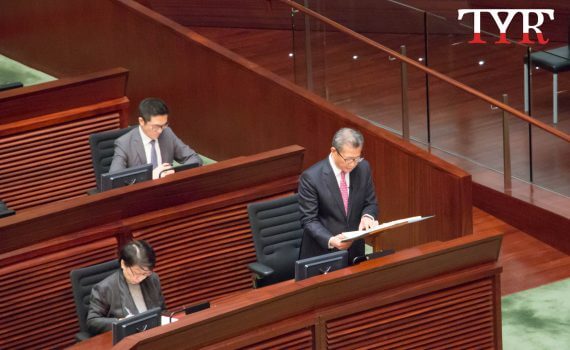
Budget 18/19: healthcare expenditure increased while no specific plans on mental health mentioned
- 2018-02-28
- Politics
- The Young Reporter
- By: Vanessa Yung、Oasis LiEdited by: Elly Wu、Kenji Chan
- 2018-02-28
Reported by Vanessa Yung, Oasis Li Edited by Kenji Chan Infographics edited by Elly Wu Financial Secretary Paul Chan Mo-po announced to increase the public healthcare services expenditure to HK$ 71.2 billion, accounting for 17.5% of total recurrent expenditure. The government provided the Hospital Authority with nearly $6 billion to increase the number of hospital beds, operating theatre sessions, the quota for general out-patient and specialist out-patient services and the manpower required. Because of the increasing demand for healthcare services, the government has invited the Hospital Authority to start planning the second 10-year hospital development plan, which is expected to deliver 3,000 to 4,000 additional hospital beds and provide additional facilities and quota for consultation. A sum of $300 billion as an initial provision is set to support this second 10-year hospital development plan, as well as improving the clinic facilities in Department of Health, upgrading and increasing healthcare teaching facilities. To address the shortage of manpower in hospitals, the government is discussing with the University Grants Committee to increase publicly-funded training capacities for doctors, nurses, dentists, and relevant allied health professionals in the coming three years. "I will ensure that the Hospital Authority has adequate resources to employ all local medical graduates," Chan said. Yuen Wai Kit, the spokesperson for Health Policy Concern, thinks the government should not only be focusing on the shortage of doctors. "The budget allocated resources to increase the number of doctors. What about other medical manpower such as nurses and occupational therapists? The society lacks all sorts of medical manpower instead of only lacking doctors," said Yuen. Mental health care is not mentioned in the budget. Hong Kong currently has 240,900 people suffering from mental illness, of whom 32,000 are teenagers, while the Hospital Authority is not providing a stable support for mental health …
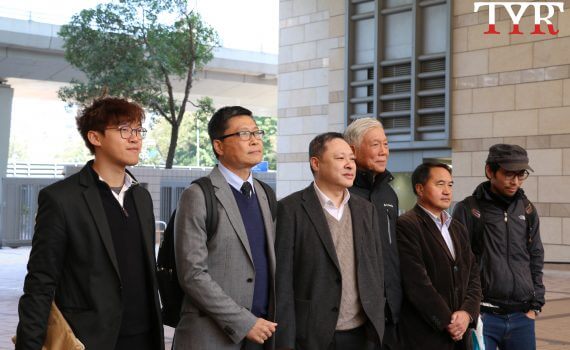
The court rejects dropping double incitement charge against Umbrella Movement defendants
- 2018-02-13
- Politics
- The Young Reporter
- By: Wallis Wang、Oasis LiEdited by: Ezra Cheung、Zinnia Lee
- 2018-02-13
The charge of inciting people to incite others to commit public nuisance against the "Occupy Central" founding trio, Benny Tai Yiu-ting, Chan Kin-man and Chu Yiu-ming, was ruled "constitutional" by the court this morning. Judge Johnny Chan Jong-herng believed that the charge "exists in the common law", saying that there is nothing "uncertain" and "unconstitutional" of the charge. The trio, Tai, Chan and Chu, was accused of three charges altogether: (1) conspiracy to commit public nuisance, (2) incitement to commit public nuisance and (3) inciting people to incite others to commit public nuisance. Defence Senior Counsel Gerard McCoy had argued that the third charge, inciting people to incite others to commit public nuisance, was neither justiciable nor constitutional in previous trials, and thus proposing a motion to rescind this charge. The judge was not convinced though, saying that inciting people to incite others is different from inciting to commit public nuisance and "cannot be treated in one single charge". Chan Kin-man, one of the Occupy Central founders, expressed his disappointment to the court after the hearing. "We are disappointed that the court accepts the incitement to incite is a lawful charge in this case," he said. "This is unprecedented." McCoy had previously argued that the prosecutor failed to provide detailed information such as the identity of involved people. But the judge stated that the prosecutor had made it clear. "Adequate and appropriate information has been given," said the judge. There had been a discussion about whether the single trial for the nine defendants could be split. The judge eventually decided to stay as a bound trial, implying that all nine defendants are to be tried and testified together even though Raphael Wong Ho-ming and Lee Wing-tat were accused of committing the crimes in places different from the rest. The judge also compared the incitement to a …
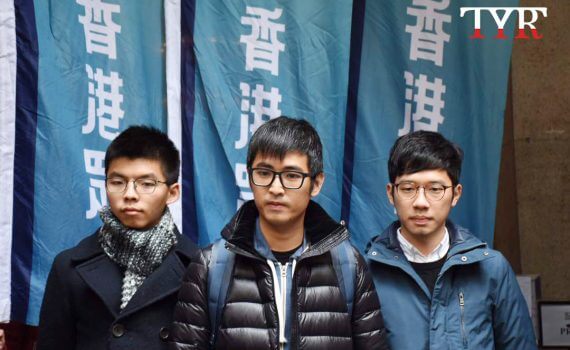
Democracy activists Joshua Wong, Alex Chow and Nathan Law set free by Court of Final Appeal
- 2018-02-06
- Politics
- The Young Reporter
- By: Katherine LiEdited by: Angie Chan、Michelle Ng
- 2018-02-06
Alex Chow, Joshua Wong, and Nathan Law walk free as Court of Final Appeal accepts their appeal this afternoon. The trio was initially arrested for breaking into the Central Government Offices and for "civil disobedience" in September 2014, which triggered the Occupy Central. However, Wong said that even though they regained their freedom, this is by no means a victory for democracy. "This set the precedent of demonstrations being viewed as violent," Wong said, "which puts all future attempts of public assembly at risk. Those who attend may receive months or years of jail sentence." Furthermore, Chow said that the lines of what is considered as violent demonstration has been blurred through this case, which is unhelpful to Hong Kong's fight for democracy. He called the court's ruling "sugar coated". The trio raised concerns that with the recent disqualification of Agnes Chow, Hong Kong is going through a very tough time. Alex Chow ultimately said that it is obvious that people in the government are under pressure to behave a certain way. The trio is free for now. But Joshua Wong faces another appeal for "contempt of court" which will soon decide whether he remains free or goes back to jail.
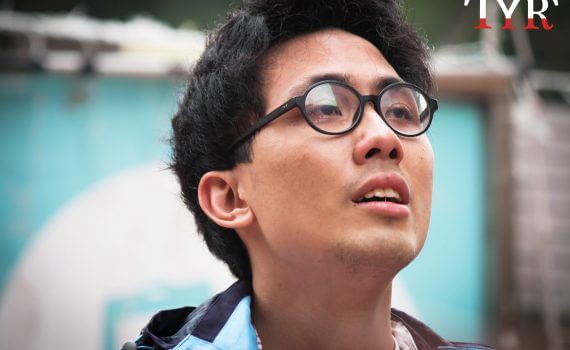
Hundreds protest against suspension of Baptist University student duo
- 2018-01-26
- Society
- The Young Reporter
- By: Elly Wu、Raphael Blet、Yoyo Chow、Katherine Li、Rob McGainEdited by: Angie Chan、Ezra Cheung、Michael Shum、Michelle Ng、Wing Li
- 2018-01-26
More than 200 people participated in a protest at Hong Kong Baptist University at 1.30 pm following the suspension of two students, according to the University's Students' Union. After being accused of threatening the staff and using abusive language during an eight-hour stand-off at the University's Language Centre, president of Hong Kong Baptist University Students' Union, Lau Tsz-kei, and a Chinese medicine student, Andrew Chan Lok-hang, were suspended pending disciplinary procedures. The University's decision to suspend the pair prompted mixed reactions with some praising the University's decision and others criticising the University for not awaiting the verdict of the disciplinary committee. A group of counter-protesters who were seen brandishing banners labelling the student union "a gang" and accused some professors of supporting the students. "We are proud of being Chinese citizens and right now, it's a Putonghua-speaking world," wrote a banner. Both parties could be seen hurling vulgarities at each other, but they were quickly separated by the security personnel. John Tse Wing-ling, former Legislative Councillor and Associate Professor of City University's Department of Applied Sciences, marched with the HKBU students in support for elimination to the compulsory Putonghua policy. "If Putonghua is really going to be a fixed standard, then this standard should also apply to all university staff members, including professors," he said, referring to the controversial requirement. Tse did not believe that a certain language should be a parameter of whether students could graduate. "If you judge everyone on the same standard, which is their Putonghua proficiency, then the Chief Executive of Macau won't even get his job," said Tse. The former lawmaker criticised the university for making the suspension of involved students public. "It's the first time in 30 years of teaching that I see a Vice-Chancellor announcing student suspension in front of the press," …
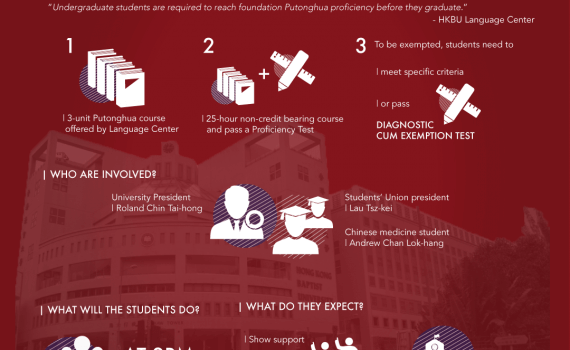
A rundown of the recent events regarding the Putonghua incident at HKBU
- 2018-01-25
- Society
- The Young Reporter
- By: Yoyo Chow、Michelle Ng、Holly ChikEdited by: Michael Shum、Angie Chan、Ezra Cheung
- 2018-01-25
Two students at Hong Kong Baptist University were suspended on Wednesday after "occupying" the Language Centre. The incident happened a week after the release of the results of the Putonghua exemption test, in which 70% of the students who took the test failed. About 30 students headed to the Language Centre and occupied the centre for eight hours. Students' Union president Lau Tsz-kei later admitted that he spoke a Cantonese swear word during the exchange with an official from the Language Centre. The University described in a mass email four days after the event that the language used by the student was "abusive" and that their behaviour was "hostile". According to the mass email to all students, staff and alumni, two students were suspended from school "based on evidence currently available" because they "have been found to have conducted themselves in a way that made our colleagues feel threatened and insulted." They have been suspended from attending classes and exams but allowed to set foot on the University's premises. The University also said "their actions had also affected the normal operation of the University and seriously violated the Student Standards of Conduct." What is the Putonghua graduation requirement? According to the Language Centre of Hong Kong Baptist University, it is stated that all "undergraduate students are required to reach foundation Putonghua proficiency before they graduate". They can either pass a 3-unit Putonghua course offered by the Language Centre or take a 25-hour non-credit bearing course and pass a Proficiency Test conducted by the Language Centre. To be exempted from the requirement, students have to meet one of the following criteria: Non-Chinese speaking students Attended the Chinese Language examination in the Mainland or Taiwan Have attained Grade C or above in the HKCEE Putonghua subject Have passed the Test of …

Children of asylum seekers deprived of education rights in Hong Kong
- 2017-12-30
- Society
- The Young Reporter
- By: Candice Wong、Erica ChinEdited by: Cecilia Wong
- 2017-12-30
Education expert and legislator call for conditional working rights of asylum seekers in supporting their own education expenses and daily expenses Isabella Ng Fung-sheung, assistant professor at The Education University of Hong Kong, volunteers at the Hong Kong Society for Asylum Seekers and Refugees. She said only one out of 170 asylum seekers can successfully make a non-refoulement claim so that they are not forced to leave the city. This process might take years, and their children may be deprived of their rights to education during the wait. Asylum seekers are not allowed to work in Hong Kong. Each person receives $1200 a month in food stamps from the government, which is enough for staple food but not much else, according to Dr. Ng. And while their children can go to school for free, Dr. Ng said asylum seekers often find it difficult to pay for school uniforms and books. Although most schools reimburse the parents for their expenses, they do have to pay upfront and then claim the money back with receipts. "Some families are not able to reach here for weekly gathering as they can't afford the transportation expenses," said Dr. Ng. Language barrier is also a major obstacle for young asylum seekers who desire education in Hong Kong, Dr. Ng stated. " The teacher kept telling me that this child cannot speak Chinese, can she understand at least one word of Chinese, if not, this child is so difficult to manage," said Dr. Ng when she recalled her experience in helping child asylum seekers searching for schools. " Local schools accept few non-Chinese speaking children," Dr. Ng says. " I tried to look for a kindergarten for a daughter of an asylum seeker once. She had a Hong Kong identity card, but eight out of ten schools …
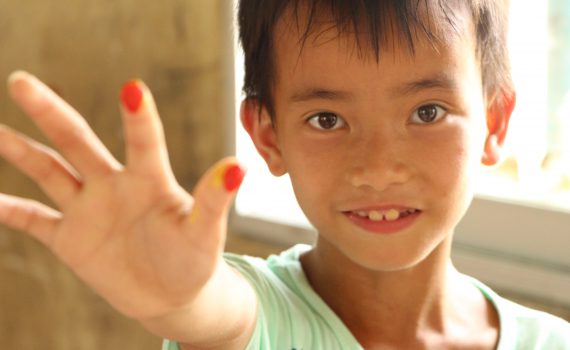
Somewhere over the rainbow - How an 8-year-old boy experience China's education gulf
- 2017-12-30
- Society
- The Young Reporter
- By: Caroline KwokEdited by: Cecilia Wong
- 2017-12-30
Every morning at 8:30, the muddy ocher-coloured cottage is blasted with young voices reading aloud textbook passages, so loud that it can be heard across the cement-levelled playground far from the school gate. There are three classrooms in the cottage with no lights but a rickety ceiling fan each. Drawings are repeatedly glued on and ripped off a section of the wall framed with red rice paper. On top, it wrote sloppily "In Celebration of the June First International Children's Day". This is where the eight-year-old Huang Wei-biao goes to school every day with his 22 young schoolmates, a village in the rural area of the East Guangxi province. The nearest town is 45 minutes of serpentine car ride away. One can tell Huang is a diligent student as he reads his textbook with his finger precisely pointing at each word when he pronounces it. One can tell Huang is an assiduous child as the veins of his neck appear every time he utters a word. One can tell Huang is an eager learner as each page of his textbook is torn and curled at the corners. Yet no matter how earnest or smart a student Huang is, he is just one the 13.8 million village primary students in China who are probably receiving education of lower quality than students who study in the urban parts of China. Village schools lack facilities and professionally trained teachers. Pupils do not have classes in other areas such as arts and physical education, let alone school outings. In comparison, the XinXing primary school in the same prefectural city has a multi-story building with a sports ground. There are more than 40 teachers and most of them have received tertiary education. Children's' parents can also find better working opportunities close by and not have …

Food Order Platforms Price Markup Up to 86%
- 2017-12-08
- Society
- The Young Reporter
- By: Susan Gao、Melissa KO、Kenji ChanEdited by: Susan Gao
- 2017-12-08
More than 60% of the meals ordered through online food order platforms were more expensive than restaurants' takeaway, with price markup up to 86%, the Consumer Council said on Wednesday. After 91 trial purchases from nine food order platforms in September, the Council found problems including hidden surcharges, unilaterally order cancellation, late delivery, food leaking and double charges. The prices of over half of the food on four aggregate order platforms such as Foodpanda and UberEATS were about 30% higher than takeaway prices, while all the food on three eatery chain platforms including McDelivery were marked up by 4% to 86% with an average of 30%, said the Council. The Council's Chief Executive Gilly Wong Fung-han said at Wednesday's press conference that they would not advise on prices, and markup was understandable if people accepted paying more for convenience. Ho Chung-yin, a 32-year-old data analyst working in Central said she had used Foodpanda four times and knew the prices were much higher. "I only order online when I don't have time to eat out," she said. Testers of the Council found five out of 13 orders were canceled without remedy when ordering on 51WM, an aggregate platform. UberEATS even listed restaurants that had already folded or were being decorated without any notice, testers said. Customer Service Director of 51WM Dickson Lo told The Young Reporter that order cancellations were all done solely by restaurants, probably because they were understaffed or the locations were too far away. "We cannot improve the problem in the long run," Lo said, "because it is a fundamental problem resulting from restaurant's own uncertainties." The Council urged traders to be responsible and delineate every party's responsibility clearly, and provide means of contacts for inquiries with immediate assistance, while three aggregate platforms still have no contact hotline. …

Yahoo Asia Buzz Awards handed out to "buzziest" icons in 2017
- 2017-12-07
- Society
- The Young Reporter
- By: Wing LiEdited by: Jianne Soriano
- 2017-12-07
The 2017 Yahoo Asia Buzz Awards was held on December 7 2017 at the Hong Kong Cultural Center. Based on search results from Yahoo's search engine, the annual Buzz Awards rewards the "buzziest" icons in the Asia-Pacific region. The awards show this year featured appearances from popular Hong Kong celebrities like Vincent Wong, Chrissie Chau, Kara Wai and Natalie Tong. Some of the notable winners include Hacken Lee, who won the awards for the "Top Buzz Local Male Singer" and the "Top Searched Song of the Year." C AllStar, Dear Jane and Supper Moment also won the "Top Buzz Local Group" award. The main highlight and closing act of the show is K-pop star Samuel Kim, who received the award of the :Most Searched Korean New Singer." He also performed three songs and closed the event. Reported by Wing Li Edited by Jianne Soriano Photos by Jianne Soriano
